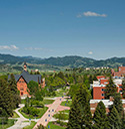Doctor of Philosophy in Indigenous and Rural Health
Overview
The PhD in Indigenous and Rural Health is designed to develop scholars, educators, and practitioners who can address the health and wellness of Indigenous and rural communities in Montana and beyond. This unique program includes a collaboration across five colleges at MSU including Education, Health and Human Development; Agriculture; Nursing; Business; and Letters and Science. By leveraging interdisciplinary knowledge across the university, this program prepares professionals to lead the development, implementation, and evaluation of health systems, programs, and policies; direct research programs; and educate and train the next generation of health professionals. This program will be available both at a distance and onsite in Bozeman.
Application Process
The Indigenous and Rural Health PhD program emphasizes relationships among faculty, staff, and students. One of the program’s requirements is that students enter already connected with their faculty mentors and that this process begins prior to submitting an application. Therefore, potential students should review the research expertise of MSU faculty affiliated with the Indigenous and Rural Health PhD program and discuss their research interests with potential faculty mentors. Applicants are encouraged to contact the coordinator of the PhD program to discuss their research interests and for guidance on contacting MSU faculty.
Degree Requirements and Coursework
To satisfy the degree requirements, students in the program must complete 60 credit hours of course work, including 18-28 dissertation credits. The program is designed to be responsive to student interests and needs and therefore the rest of the program courses will be decided by the student and their committee. Typically, in the beginning of the third year of the program students are required to complete the comprehensive exam. Students will prepare a grant proposal based on one or more elements of his/her proposed dissertation research. The proposal will be prepared according to specifications of a potential funding source that is relevant to the student’s career trajectory.
Students in the Indigenous and Rural Health PhD program will complete dissertations and can select either an academic track or an applied track depending on their career goals. The academic track will take the form of the Manuscript Format Option of the Montana State University Graduate School, with a minimum of three completed manuscripts. The applied track will be focused on meeting community-defined interests and needs, where students, in consultation with their committee and community, will select three projects to complete such as a community needs assessment, program evaluation, and other projects that assist community well-being. This option will include a community presentation and a public presentation defense to their committee and public. This option can include completed manuscripts.
About the Curriculum
There are three curriculum options for students entering the program. Option 1a is for those who wish to earn a master’s degree in community health on the way to completing the PhD in Indigenous and Rural health (3.5-4 years to completion). Option 1B is for those who have completed a master's degree and want to start directly into the PhD program (3 years to completion depending on prior coursework). Option 2 is for students who start the program with a bachelor's degree in Nursing. Students in this option may receive a master’s degree in community health if they decide to leave the program prior to completing the PhD requirements. However, they must still complete the community health master’s degree requirements to receive the degree.
Up to 21 credits from prior graduate work can be considered for the PhD (exact courses to be considered for credit determined by department).
Remote Learning
Students enrolled in the PhD in Indigenous and Rural health program will be in a face-to-face program with accommodations for remote learners. The required classes include “Indigenous and Rural Health” which is offered as a hybrid course where students can participate in the classroom or online. The other required core course is the “Building a Culture of Wellness” Seminar, which is a 1 credit, 1-week summer course. The purpose of the summer course is to build a community across the cohort which may be especially important for the distance students. The curriculum link above provides a list of optional elective courses. There is a mix of distance, in-person, and hybrid courses across the areas of focus that the student may select. Through these options the student may select all distance courses or all in-person or a mixture to meet degree requirements.
Frequently Asked Questions
Please see the expenses page in the MSU Catalog.
Due to the interdisciplinary nature of the program, we will review a wide range of majors. Please contact the program leader if you have further questions.
Entering graduate students will have completed a bachelor’ s degree or master’s degree. Students may undertake the Ph.D. following completion of a master’s degree, or exceptional students may apply directly following completion of a bachelor's degree earning master’s degree in community health during the first two years of the program.
Graduate School
P.O. Box 172580
Montana State University
Bozeman, MT 59717-2580
If sending electronically:
The personal statement should address the following:
- relevant past and present academic and/or employment background
- areas of interest for your dissertation ressearch in Indigenous and/or rural health
- alighnment of your research interests with specific faculty at MSU
- professional goals and career plans
Once the candidate's application is complete, it will be reviewed by the faculty.
Professional colleagues, such as former instructors, advisors, and supervisors write the applicant's letters. If the applicant has a master's degree, at least one letter should be from a master's degree committee member.
Summer semester
Yes, your application is valid for one calendar year. An applicant might consider revising his or her personal essay and updating letters of recommendation.
We are not able to provide feedback to candidates. However, we encourage applicants to meet with affiliate faculty to discuss the application before submission.
Graduate research assistantships may be available through research grants awarded to faculty members, but graduate teaching assistantships and other forms of support are also available on a limited basis.
Answer
|
Faculty Member
|
Department/Division
|
Interests
|
Email
|
|---|---|---|---|
|
Grant, Vernon
|
How physical acivity, sleep, and screentime impact obesity risk in American Indian
populations, especially in his home community
|
||
|
|
|||
|
Sociology of education
|
|||
|
Water quality
|
|||
|
Infants and toddlers with additional support needs and their families who receive
early intervention services.
|
|||
|
|
|||
|
Sexual health
|
|||
|
Mental health, aging and disability, health disparities
|
|||
|
Community-Based Participatory Research approaches to addressing health and health
literacy; using strength-based intervention strategies in partnerships with Indigenous
communities
|
|||
|
Systems-based action toward social and environmental improvements, fostering sustainable
organizational cultures and identities that support collective and and community well-being,
and Indigenous entrepreneurship.
|
|||
|
Evaluating mind-body exercise to improve mood symptoms in women
|
|||
|
Reducing health disparities via health promotion with Latinx immigrants
|
|||
|
Healthcare disparities; school nursing; school based health centers, global nursing,
nursing education
|
|||
|
Rural healthcare providers' ability to take care of children, pediatrics, pediatric
advanced life support
|
|||
|
Statistics
|
|||
|
Early vertebrate development including both gastrulation and neurulation
|
|||
|
Psychoneuroimmunology, socioeconomic status, health disparities, early life experiences,
family dynamics, social experiences and health
|
|||
|
Substance use and addiction. Specific research interests include cultural adaptation
of evidence-based treatments, culturally grounded approaches to healing trauma and
addiction, and using empirical evidence to harness community power and change public
policy to improve health. A focus on anti-racism and health equity is central to my
research.
|
|||
|
|
|||
|
Adolescence and young adulthood, health risk behaviors, drug and alcohol use, rural
populations, immigrant populations, positive youth development
|

















